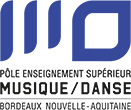 Professional development qualifications
Professional development qualifications
The department for professional development of the PESMD Bordeaux Aquitaine organises courses subsidised by the state and the Aquitaine region with the aim of responding to the training needs of performers, and teachers of music, dance and voice.
STATE DIPLOMA OF DANCE TEACHING – PROFESSIONAL DEVELOPMENT – IN FURTHER TRAINING
Entry requirements and contents (see the dance syllabus)
State Diploma of MUSIC Teaching – professional development– in further training
Information on the schedule of the course:
The course takes place primarily on one to two days per week and also during some days in the school holidays.
Location: To define
Schedule: The schedule and the dates for the next course have not yet been decided, this information will be announced on this website.
Download pdf:
Textes Généraux JO mai2011 DE Professeur Musique.pdf
Référentiel de compétence professeur de musique 2011.pdf
Areas of study available at PESMD Aquitaine:
- Instrumental and vocal studies – from classical to contemporary music
- Jazz
- Popular Music
- Traditional music
- Musical teaching

Entry Requirements for the State Diploma (DE) of further training are defined in the decree from May the 5th 2011.
Below: An extract from the decree of May the 5th 2011 – Article 3.
"Access to further training in the State Diploma of Music Teacher is conditional on the passing of an entry exam, which is open to candidates who have interrupted their initial musical studies for more than two years, and who are able to fulfil one of the following conditions:
– Proof of professional teaching experience, having been self-employed for at least two years, teaching for five hours a week, thirty weeks per year or the equivalent number of hours yearly.
– Justify a professional artistic practise for a duration of at least two years and particularly, be able to present a record of forty eight paid lessons.
– Be the holder of a music degree (diplôme d’études musicales - DEM) or a National Diploma (diplôme national d’orientation professionnelle de musique - DNOP), and engage in teaching activities as a salaried employee for at least five hours a week for thirty weeks, or be undergoing professional reorientation.
The candidates, having obtained a section of their degree by validating their required experience within the conditions presented in chapter two of the present degree, will be allowed to be admitted to the course for the units and modules not yet passed, following an interview, depending on the maximum intake of the organisation.
The candidates, having obtained a section of their degree through the initial training or have been doing it for at least five years will be allowed onto the course for the units and modules not yet passed, in the light of an application recounting their training course and their professional experience, following an interview, depending on the maximum intake of the organisation."
The degree is obtained by passing the following Taught Units followed by final exams.
PROCEDURE:
Signing up/entry forms:
The applications will be available to download from this website when the next season is announced.
The candidates send their complete application papers to the PESMD Bordeaux Aquitaine.
Entry Examination:
The notices specifying the exam date will be sent to the candidates if their application is deemed eligible. This process takes place in Bordeaux.
Written Tests
- Commentary on a literary teaching text (duration 3 hours)
- Commentary after listening to and analysing a score (duration 4 hours for instrumentalists, singers and musical training)
- Listening test (duration 3 hours for jazz, popular music and traditional music)
Listening Tests
-
Interpretation of works or fragments of works. The program chosen by the candidate must consist of at least three works in different styles. The auditioning panel will choose the works or fragments of works from their program (duration 20 mins); for the candidates in musical training one of the presented works will be played accompanied by a polyphonic instrument of their choice. This is followed by an easy sight-reading test on the piano and voice.
The practical test is disqualifying. -
For the candidates remaining after the vocal or instrumental test:
- Individual sight-reading test for classical or contemporary voice and instrument
- Group sight-reading for jazz and popular music
- Writing down music learnt by ear, followed by a performance and variations for traditional music -
Interview with the panel
Support for course fees
The amount to pay for the teaching fees will be circulated as soon as possible. A personalised education quote will be made upon request.
For each course there are two separate tariffs:
Individual tariff: if the fees will be paid for directly by the candidate and on proof of refusal of the employee to pay.
Employers tariff: if the fees will be paid by the employer.
The fees and the terms relating to payment do vary, so we invite you to contact us.
Request for financial support with the course fees:
Request for financial support with the course fees must be done by the candidate with their employer or the OPCA or the OPACIF of the employer’s organisation. It recommended that you approach the person in charge before the entry examinations.
- Territorial Staff (municipal music schools) will be able to make the request with their employer
- Contract workers can request support with the AFDAS in order to find out their rights and the most appropriate action to take
- Independent applicants or part of a private organisation can make a demand with their OPCA (FIFPL, Fongécif…)
- Jobseekers can go to the employment agency
- Private or public organisations (associated music schools contributing to Uniformation) can make a request with Uniformation through their employers
- Other cases: Contact us
The PESMD is at your disposal to help you through the process.
Information:
Caroline FOLLANA – Further Training Advisor
